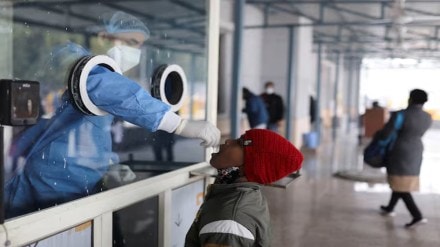As India experiences a mild but growing resurgence in COVID-19 infections, the Delhi government has issued an advisory, urging hospitals to prepare for the availability of beds, oxygen, medicines, and vaccines. The Delhi health minister said 23 COVID-19 cases have been reported in Delhi so far. This proactive step comes as several Indian cities, including Mumbai, Chennai, and Pune, ramp up surveillance and preparedness measures in response to an uptick in cases.
Delhi Health Minister Pankaj Kumar Singh says, “As of yesterday, a total of 23 COVID cases have been reported in Delhi… The Delhi government is currently verifying whether these patients of Delhi or have come from outside the city. In terms of preparedness, we have already coordinated with all medical superintendents, doctors, and their teams. The Delhi government is fully prepared to deal with any situation, and there is no need for the public to panic…”
Delhi: Health Minister Pankaj Kumar Singh says, "As of yesterday, a total of 23 COVID cases have been reported in Delhi… The Delhi government is currently verifying whether these patients of Delhi or have come from outside the city. In terms of preparedness, we have already… pic.twitter.com/lcTNYLjKnQ
— IANS (@ians_india) May 23, 2025
Mumbai has emerged as a focal point in this current wave, reporting 95 COVID-19 cases in May alone. This constitutes a significant portion of Maharashtra’s total of 132 cases recorded since January. Currently, 16 patients are hospitalised in Mumbai, prompting officials to transfer some from KEM Hospital to Seven Hills Hospital to mitigate further spread. Pune, despite reporting only a single case in May, has taken precautionary measures by reserving 50 beds at Naidu Hospital.
COVID-19 cases in Haryana, Pune and Tamil Nadu
In Haryana, three new cases have been confirmed, raising alert levels in Gurugram and Faridabad. A 31-year-old woman in Gurugram, recently returned from Mumbai, and a 62-year-old male resident with no travel history have both tested positive and are in isolation. Faridabad also reported a positive case in a 28-year-old security guard who is now receiving treatment in Delhi.
Meanwhile, Pune, despite registering only a single COVID-19 case in May (an 87-year-old who has since recovered), is taking no chances. The Pune Municipal Corporation has proactively reserved 50 beds at Naidu Hospital. Dr. Nina Borade, Pune’s health chief, noted that while testing in civic hospitals is currently on hold, authorities are awaiting revised central government guidelines.
Further south, Tamil Nadu is observing a gradual rise in infections, with 12 cases reported from Puducherry and a concerning trend in Chennai. Dr. Subramaniam Swaminathan, an infectious diseases expert at Gleneagles Healthcity, highlighted a shift: “Two weeks ago, 60% of viral cases were influenza A or B. Now, it’s Covid-19.” This uptick has even led some hospitals to postpone high-risk procedures like organ transplants and heart surgeries. Public health director Dr. T S Selvavinayagam urged caution in crowded settings but reassured the public against panic, emphasising that COVID-19 continues to circulate with seasonal surges.
Why surges in COVID-19 cases?
The driving force behind this current increase is believed to be the emergence of two new subvariants, OF.7 and NB.1.8, both descendants of the JN.1 Omicron lineage. While JN.1 itself is classified by the WHO as a “variant of interest,” its subvariants are under global scrutiny due to their heightened transmission potential.
Health experts attribute the rise in cases to a confluence of factors: the increased transmissibility of these new variants, waning population-level immunity, limited efficacy of older vaccines, greater social mobility, and a noticeable reduction in public adherence to preventive measures. Authorities continue to advise vigilance, emphasising the importance of COVID-appropriate behaviour, especially in crowded environments
(With PTI Inputs)
